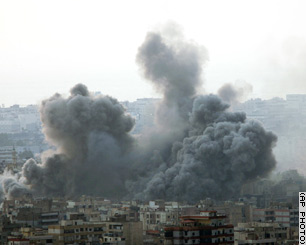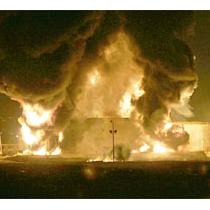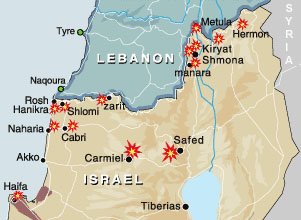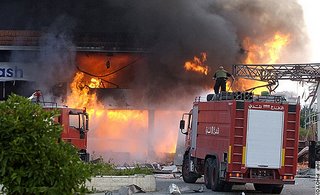Saturday, July 15, 2006
Iran and Syria Manipulate Tensions in the Middle East

While, to the untrained eye, things seem to be escalating out of control in the Middle East, in actuality things are far more controlled than people realize – much to the consternation of Iran and Syria. Acting through Hezbollah, a terrorist group backed by the two countries, Iran and Syria tried to instigate an all-out war in the Middle East by raising sympathies for the people of Lebanon.
 Syria and Iran knew how harshly Israel would respond to the attack on Israeli soil on Wednesday. They knew, as well, that by using Hezbollah to capture the Israelis, they could push most of the consequences on Lebanon, which is guilty of nothing more than being too weak to reign in the terrorist organization which maintains de-facto control over South Lebanon and occupies 23 of 128 seats in Lebanon’s parliament.
Syria and Iran knew how harshly Israel would respond to the attack on Israeli soil on Wednesday. They knew, as well, that by using Hezbollah to capture the Israelis, they could push most of the consequences on Lebanon, which is guilty of nothing more than being too weak to reign in the terrorist organization which maintains de-facto control over South Lebanon and occupies 23 of 128 seats in Lebanon’s parliament.
What Iran and Syria did not anticipate was the lack of willingness from other Muslim nations to rush to the defense of Lebanon. Additionally, the countries did not anticipate the lack of stiffer condemnation from the world community of Israel’s aggression, nor did they anticipate that most countries would see through the kidnappings and raid as an attempt at pushing an all-out war with Israel. As long as this remains a miscalculation, Iran and Syria’s latest plot against Israel will remain a failure.
Iran and Syria’s Intentions
Iran and Syria’s goals are easy to see: help defend Hamas in Gaza and start a large regional war, as these countries have been pushing for since Ahmadinejad’s election last year. The war would be a response to the tragic plight of the Lebanese people, who do not have the prowess to defend against either Hezbollah or Israel. Already, Lebanon is considered a “disaster zone”, and the offensive is just ramping up.
 I wrote last week that, so long as the Muslim world remained unwilling to defend Hamas in Gaza, Israel’s campaign there would be a success, perhaps not in finding Gilad Shalit, but definitely in undermining Hamas’ authority with the Palestinian people. Israel will never see Hamas as a partner for peace, and has been looking for a way to oust them from power since their election; the kidnapping of Shalit is the perfect excuse to do just that.
I wrote last week that, so long as the Muslim world remained unwilling to defend Hamas in Gaza, Israel’s campaign there would be a success, perhaps not in finding Gilad Shalit, but definitely in undermining Hamas’ authority with the Palestinian people. Israel will never see Hamas as a partner for peace, and has been looking for a way to oust them from power since their election; the kidnapping of Shalit is the perfect excuse to do just that.
The same can be said for Hezbollah. Israel sees Hezbollah as a continuous threat to Israel’s security. It is also clear that, in a direct confrontation, Hezbollah cannot stand up to the Israeli military machine. Thus, unless Iran and Syria can find a way to drag other countries into this latest confrontation with Israel, it seems clear that Israel will use this opportunity to eliminate two of its greatest threats: Hamas and Hezbollah.
Unquestionable Provocation by Two Terrorist Organziations
Every country in the region knows that a regional war would be costly, in terms of both human lives and infrastructure, and the regimes of the Muslim countries are not going to be easily conned into entering the conflict. They know that, while there can be many questions about Israel’s occupation of the Palestinian people, that the kidnapping of Shalit represents a clear escalation by Hamas, and an escalation that Israel would not sit still for.

And the kidnapping of two additional soldiers off of Israeli soil in Northern Israel is an even greater escalation. Hezbollah rhetoric that the attack was on Lebanese soil is directly controverted by the UNs proclamation, agreed to by all Muslim nations in the UN security council, indicating that Israel had withdrawn to the appropriate border in 2000, meaning that the Shabaa farms are indeed Israeli territories. Thus, Hezbollah’s attack Wednesday must be seen as an invasion of Israel, and must be dealt with.
Hezbollah was supposed to be demilitarized after Israel withdrew unilaterally from Lebanon in 2000. Instead, they have continued firing missiles into Israel’s northern territories for the 6 years since the withdrawal, leading Israel to also be looking for an excuse to deal with the Southern Lebanon problem. The invasion of Israel by Hezbollah on Wednesday serves as exactly that excuse.
Excessive Force? No Surprises There!
 One can argue that Israel has exercised excessive force, and certainly that may be true in Gaza and Lebanon. It is unfortunate that the country of Lebanon is suffering the brunt of the attack, in my opinion. I think they’ve done little to merit the bombardment from Israel. But the party to blame is Hezbollah, and backers Syria and Iran, who knew full well how Israel would respond to the invasion and capture of Israeli soldiers.
One can argue that Israel has exercised excessive force, and certainly that may be true in Gaza and Lebanon. It is unfortunate that the country of Lebanon is suffering the brunt of the attack, in my opinion. I think they’ve done little to merit the bombardment from Israel. But the party to blame is Hezbollah, and backers Syria and Iran, who knew full well how Israel would respond to the invasion and capture of Israeli soldiers.
In every major war Israel has taken part in, they’ve begun by destroying supply lines, then destroying communication lines, and finally taking out command centers, allowing the Israeli military to sweep through a region with far less resistance and achieve its desired objective. Israel has done the same here, blockading the country from air, sea, and ground, destroying airports bridges, and roads, and finally attacking Hezbollah offices and weapons storage facilities.
 Even the civilian casualties could have been predicted. In 1996, Israel carried out Operation Grapes of Wrath in Lebanon, killing 165 people in 17 days, an operation that was eventually stopped by international pressure after a UN base was shelled accidentally as Israel went after a Hezbollah mobile launching unit that had been stationed behind the base. To date, 60 Lebanese civilians have been killed in 4 days, and escalation from 1996 but not a drastic one.
Even the civilian casualties could have been predicted. In 1996, Israel carried out Operation Grapes of Wrath in Lebanon, killing 165 people in 17 days, an operation that was eventually stopped by international pressure after a UN base was shelled accidentally as Israel went after a Hezbollah mobile launching unit that had been stationed behind the base. To date, 60 Lebanese civilians have been killed in 4 days, and escalation from 1996 but not a drastic one.
Hezbollah knew this, they knew the consequences to Lebanon of attacking Israel as they did on Wednesday. So why did Hezbollah make such an attack, instead of the normal terrorist actions that merit a more limited response from the Israeli military? Because Syria and Iran, who control Hezbollah, care little for Lebanon or the Lebanese people! These countries used Lebanon as a pawn to be sacrificed with the hope of gaining the support of other Muslim nations, without regard to the repercussions to Lebanon itself.
The Imminent Dangers
Hezbollah, uncaring about the lives of the people in Lebanon, is more than willing to declare war against Israel. It’s a war they cannot win, but if history repeats itself, it’s a war they can escape from when the fighting gets too bad, leaving the Lebanese people to feel the full brunt of the Israeli war machine.
So where does the danger lie, if it’s not in the conflict between Israel and Hezbollah, and clearly not in the conflict between Israel and Hamas? The gravest danger lies in the potential to draw in other Muslim countries! As the fighting increases, there is a growing chance that other countries will step in to defend Lebanon, in many ways victims in this latest conflict. Presently, the other Muslim countries see the dangers of a regional war, and are avoiding it, condemning Israel’s excessive force along with Hezbollah’s provocation.
 But will that last? Will Egypt and Jordan, as well as other countries in the region, stand by while Israel bombards Lebanon mercilessly in an effort to, once and for all, eradicate the threat of Hezbollah on Israel’s northern border? In the end of the day, removing Hezbollah may be a real positive for the people of Lebanon, who have suffered from the actions of Hezbollah time and again over the years. But it is doubtful that this will be the view of the other Muslim nations. At some point they may join the fray.
But will that last? Will Egypt and Jordan, as well as other countries in the region, stand by while Israel bombards Lebanon mercilessly in an effort to, once and for all, eradicate the threat of Hezbollah on Israel’s northern border? In the end of the day, removing Hezbollah may be a real positive for the people of Lebanon, who have suffered from the actions of Hezbollah time and again over the years. But it is doubtful that this will be the view of the other Muslim nations. At some point they may join the fray.
And there is the possibility of dragging a country from outside the region into the conflict. Muslim nations have been trying to work with the UN security council and with the US to push Israel to back off this offensive, to no avail; Israel knows that opportunities to really shut down terrorist organizations with some justification are rare, and they are unwilling to let this opportunity slip by. Admonitions by the UN of Israel’s aggression will continue to fall on deaf ears.
But other avenues are being explored. Already there is talk of Iran shutting off oil shipments should Russia, China and the US allow the attacks on Gaza and Lebanon to continue. There is a consistent worry that this will be enough to push a country like China, so dependant on Iranian oil, into the conflict, and that this could force Israeli allies, like the US, to also participate. This is largely why everyone is pushing for calm on this tumultuous front.
Correctly Placing the Blame
 Still, many world leaders, including leaders in Lebanon, around the Middle East, and around the world, are calling for Syria and Iran to reign in Hezbollah. They all recognize that the orders are coming from the two nations, and that should they call for the bombings of Israel to cease, the bombings will, indeed, cease.
Still, many world leaders, including leaders in Lebanon, around the Middle East, and around the world, are calling for Syria and Iran to reign in Hezbollah. They all recognize that the orders are coming from the two nations, and that should they call for the bombings of Israel to cease, the bombings will, indeed, cease.
But so far Iran and Syria have shown no willingness to pull back on attacks on Israel. Neither country is feeling any direct repercussions to their aggressions, and as such there is no reason to stop the offensive. Neither Iran nor Syria care for the well-being of Lebanon or the Lebanese people, and as long as attacks do not hit Syrian or Iranian soil, there is little reason to believe they will call off the Hezbollah attacks.
Conclusions
Right now, the war in Lebanon, Israel, and Gaza is not as out of control as people believe, and if the status remains as it is today, the outcome is bright for Israel, and perhaps even for the region. True, there will be many casualties, but the end result will be the removal of two of the largest terrorist threats in the region in Hamas and Hezbollah, both of whom have experienced increasing power over the past few years.
However, many scenarios exist that could allow this conflict to spiral out of control, most of which focus on drawing other countries into the conflict, and these scenarios are much scarier than the one being seen today. It is in everyone’s best interest to ease tensions before other countries do enter the fray, resulting in a situation which could become catastrophic in a short amount of time.

technorati tags: Iran, Syria, Lebanon, Israel, Middle East, Hezbollah, Gilad Shalit, Hamas, United Nations, United States, Grapes of Wrath, Gaza, Oil
Posted by Scottage at 5:28 PM /
| |




 Syria and Iran knew how harshly Israel would respond to the attack on Israeli soil on Wednesday. They knew, as well, that by using Hezbollah to capture the Israelis, they could push most of the consequences on Lebanon, which is guilty of nothing more than being too weak to reign in the terrorist organization which maintains de-facto control over South Lebanon and occupies 23 of 128 seats in Lebanon’s parliament.
Syria and Iran knew how harshly Israel would respond to the attack on Israeli soil on Wednesday. They knew, as well, that by using Hezbollah to capture the Israelis, they could push most of the consequences on Lebanon, which is guilty of nothing more than being too weak to reign in the terrorist organization which maintains de-facto control over South Lebanon and occupies 23 of 128 seats in Lebanon’s parliament. I wrote last week that, so long as the Muslim world remained unwilling to defend Hamas in Gaza, Israel’s campaign there would be a success, perhaps not in finding Gilad Shalit, but definitely in undermining Hamas’ authority with the Palestinian people. Israel will never see Hamas as a partner for peace, and has been looking for a way to oust them from power since their election; the kidnapping of Shalit is the perfect excuse to do just that.
I wrote last week that, so long as the Muslim world remained unwilling to defend Hamas in Gaza, Israel’s campaign there would be a success, perhaps not in finding Gilad Shalit, but definitely in undermining Hamas’ authority with the Palestinian people. Israel will never see Hamas as a partner for peace, and has been looking for a way to oust them from power since their election; the kidnapping of Shalit is the perfect excuse to do just that.
 One can argue that Israel has exercised excessive force, and certainly that may be true in Gaza and Lebanon. It is unfortunate that the country of Lebanon is suffering the brunt of the attack, in my opinion. I think they’ve done little to merit the bombardment from Israel. But the party to blame is Hezbollah, and backers Syria and Iran, who knew full well how Israel would respond to the invasion and capture of Israeli soldiers.
One can argue that Israel has exercised excessive force, and certainly that may be true in Gaza and Lebanon. It is unfortunate that the country of Lebanon is suffering the brunt of the attack, in my opinion. I think they’ve done little to merit the bombardment from Israel. But the party to blame is Hezbollah, and backers Syria and Iran, who knew full well how Israel would respond to the invasion and capture of Israeli soldiers. Even the civilian casualties could have been predicted. In 1996, Israel carried out Operation Grapes of Wrath in Lebanon, killing 165 people in 17 days, an operation that was eventually stopped by international pressure after a UN base was shelled accidentally as Israel went after a Hezbollah mobile launching unit that had been stationed behind the base. To date, 60 Lebanese civilians have been killed in 4 days, and escalation from 1996 but not a drastic one.
Even the civilian casualties could have been predicted. In 1996, Israel carried out Operation Grapes of Wrath in Lebanon, killing 165 people in 17 days, an operation that was eventually stopped by international pressure after a UN base was shelled accidentally as Israel went after a Hezbollah mobile launching unit that had been stationed behind the base. To date, 60 Lebanese civilians have been killed in 4 days, and escalation from 1996 but not a drastic one.  But will that last? Will Egypt and Jordan, as well as other countries in the region, stand by while Israel bombards Lebanon mercilessly in an effort to, once and for all, eradicate the threat of Hezbollah on Israel’s northern border? In the end of the day, removing Hezbollah may be a real positive for the people of Lebanon, who have suffered from the actions of Hezbollah time and again over the years. But it is doubtful that this will be the view of the other Muslim nations. At some point they may join the fray.
But will that last? Will Egypt and Jordan, as well as other countries in the region, stand by while Israel bombards Lebanon mercilessly in an effort to, once and for all, eradicate the threat of Hezbollah on Israel’s northern border? In the end of the day, removing Hezbollah may be a real positive for the people of Lebanon, who have suffered from the actions of Hezbollah time and again over the years. But it is doubtful that this will be the view of the other Muslim nations. At some point they may join the fray. Still, many world leaders, including leaders in Lebanon, around the Middle East, and around the world, are calling for Syria and Iran to reign in Hezbollah. They all recognize that the orders are coming from the two nations, and that should they call for the bombings of Israel to cease, the bombings will, indeed, cease.
Still, many world leaders, including leaders in Lebanon, around the Middle East, and around the world, are calling for Syria and Iran to reign in Hezbollah. They all recognize that the orders are coming from the two nations, and that should they call for the bombings of Israel to cease, the bombings will, indeed, cease. 
